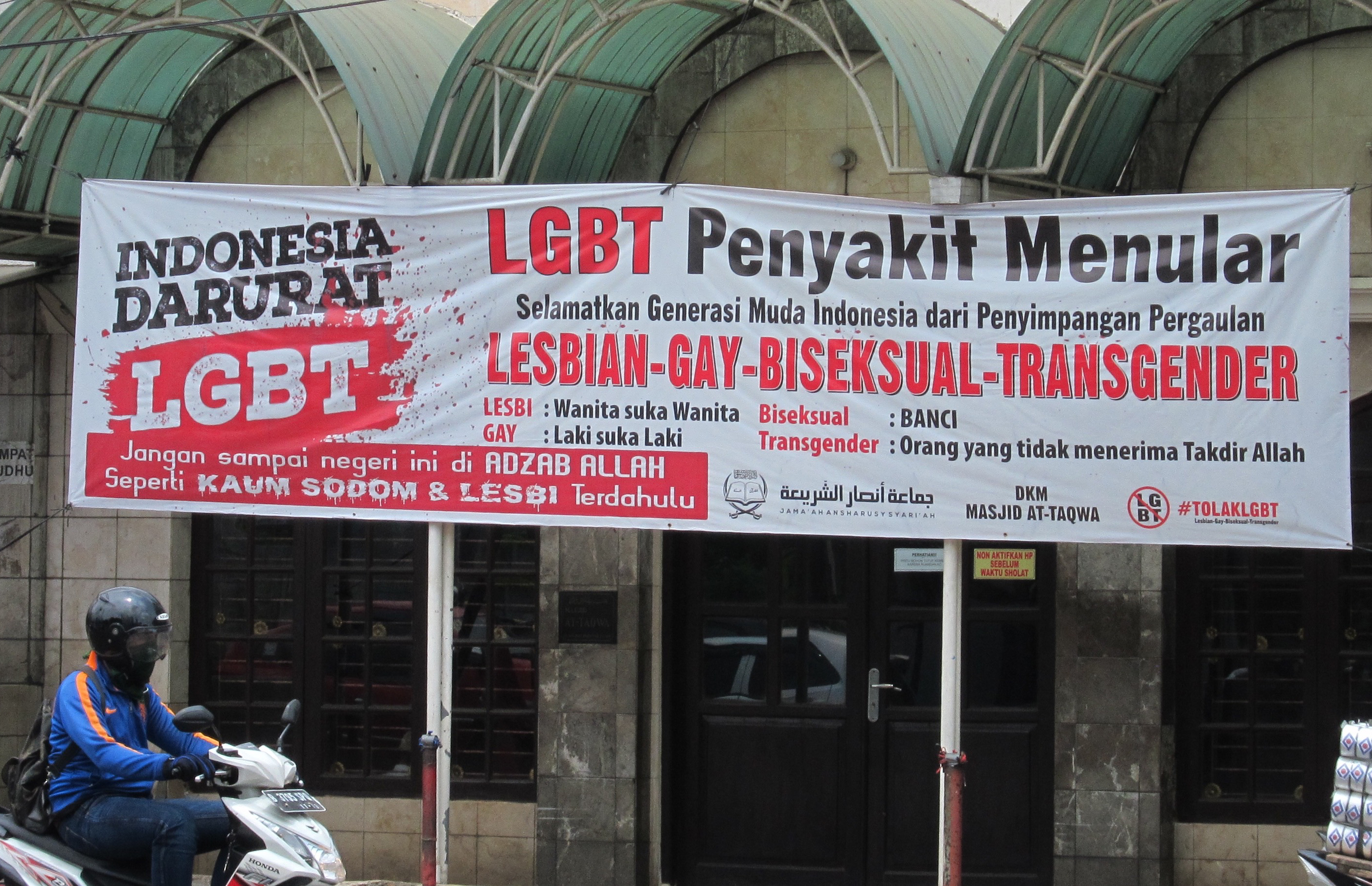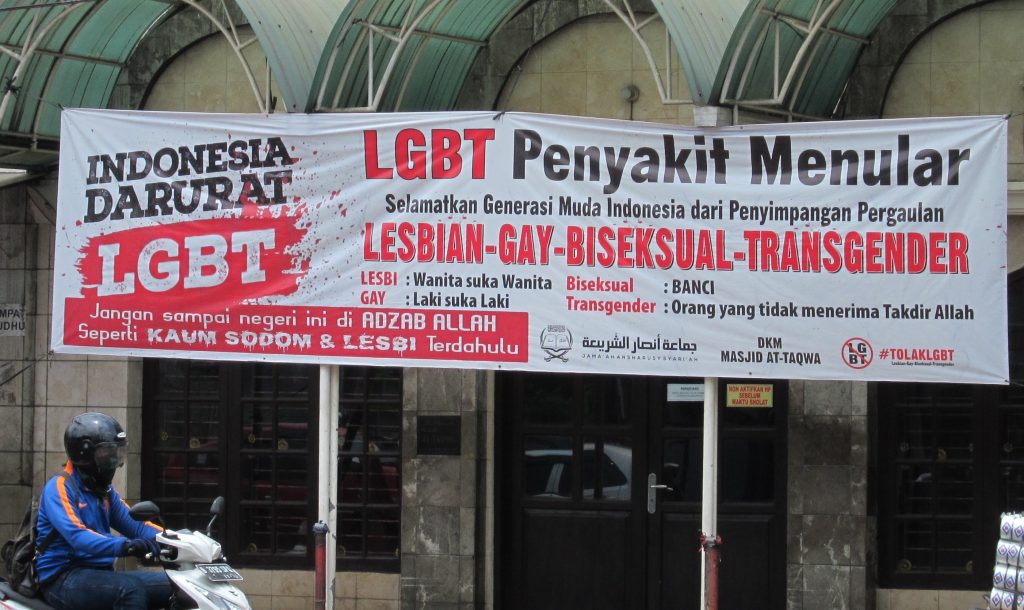
An anti-LGBT banner in Jakarta. Photo by Jamison Liang.
More than a decade of homophobic local bylaws has seen a marginalised community made more vulnerable.
What started with one minister’s call to stop universities from allowing on-campus support groups has spiralled into a free-for-all against the LGBT community in Indonesia.
It’s seen the trending hashtag #TolakLGBT (reject LGBT) whip up hate across the web, stickers pulled from a popular app, backlash against a UN project on LGBT rights, the psychiatry board labelling it a mental disorder, and the country’s largest Islamic organisation as well as politicians and government officials saying sufferers should be ‘rehabilitated’.
The latest round of rhetoric and renewed anti-LGBT sentiments have thrown the controversial issue of lesbian, gay, bisexual and transgender rights and their place in Indonesia into the spotlight. But beyond the fervour that now seems to be sweeping the nation, the attack is nothing new, particularly when we look at morality-based local legislation.
Over the last 12 years LGBT rights in Indonesia have been challenged by the proliferation of homophobic local bylaws (peraturan daerah or perda). While originally intended to give local officials and legislatures more power over their provinces, districts, and cities, many of these perda reflect a problematic regulation of sexuality, especially that of lesbian, gay, bisexual, and transgender citizens. For example:
1) Palembang City Bylaw No. 2/2004, Ch. 5 Art. 8 states that prostitution includes: ‘homosexuality, lesbianism, sodomy, sexual harassment, and making pornography.’
2) Padang Pariaman District Bylaw No. 2/2004 on Prevention, Prosecution, and Suppression of Immoral Acts states that ‘prostitutes are men or women who conduct sexual acts with the opposite or same-sex for the purpose of sexual pleasure ad material benefits.’
3) Sawahlunto/Sinjujing District Bylaw No. 19/2006 on the Prevention and Control of Immoral Acts defines adultery as ‘sexual relations outside of marriage that are performed by men and women or people of the same-sex based on consensual love.’
4) Banjar District Bylaw No. 10/2007 on Social Order notes ‘prostitutes are men or women who receive merit for their service . . . for normal or abnormal sexual acts with different people who are the same of opposite sex to their own.’
5) Tasikmalaya City Bylaw No. 12/2009 states in Art. 3(5) that ‘every Muslim is required to avoid immoral acts such as adultery and prostitution committed by both opposite and same-sex (homosexual/lesbian) people.’
6) Padang Panjang City Bylaw No. 9/2010, in amending Perda No. 3/2004 on the Prevention, Suppression, and Prosecution of Immoral Acts, states that ‘everyone is prohibited to engage in homosexual or lesbian acts or to engage in homosexual or lesbian relationships with or without pay.’
In Aceh, the only province with the ability to implement Syariah[1], we see the same pattern with the passing of the Qanun Jinayat (Criminal Bylaw) last year. It criminalises married adulterers and prescribes severe fines, imprisonment, or caning punishments for paedophilia, rape, and anal sex (liwath) and sexual intimacy between women (musahaqah). Banda Aceh’s mayor has gone a step further in recent weeks by putting together a special team that will counter the “LGBT problem” by informing the public of the danger LGBT people pose both to youth and to Islam.
Each of these local bylaws is susceptible to being cancelled by the central government through a Presidential Regulation on the grounds of contravening the “public interest” or contradicting a higher law. In principle, this review system should prevent unconstitutional or discriminatory local bylaws from being implemented. While perda related to taxes and politically inflammatory acts have been scrutinized by the central government, Jakarta has been less willing to intervene on bylaws dealing with morality, thereby allowing the disturbing legal precedent of explicitly defining homosexuality as an “immoral act” or an indicator of prostitution.
One issue these bylaws on homosexuality raise is how waria and priawan (roughly translated as transgender females and transgender males) are impacted. Are all lesbian, gay, bisexual, transgender (LGBT) identities conflated as instances of homosexuality? As cases across the country illustrate, waria are more susceptible to being harassed, illegitimately arrested on charges of prostitution, and jailed according to the sex on their national ID card. In this sense, waria may continue to be affected more severely by anti-prostitution laws and anti-LGBT rhetoric due to their visibility – the recent pressure to close Al Fatah pesantren for waria in Yogyakarta being a case in point. Regulations on homosexuality simply serve to extend their reach to include those who may be less visible.
To situate local legislation within the current national debate on LGBT rights, it is notable that the central government has appeared to walk back from initial calls to push a new bill through parliament to criminalize LGBT people at the national level. Vice President Jusuf Kalla, despite speaking out against UNDP’s Being LGBT in Asia project, has said that he has no problem with LGBT people in the private sphere – the problem is “if it becomes a movement (gerakan) to influence other people[2].”
Intan Paramaditha has rightly pointed to the political “fear of gerakan,” noting that gerakan invokes a fear of the unknown, an underlying, ungraspable threat to national unity. Indeed, Indonesian defence minister, Ryamizard Ryacudu, likened the LGBT movement to a dangerous proxy war in which Western countries have brainwashed Indonesians so as to undermine state sovereignty.
Yet the majority of politicians have stuck a more complicated tone espoused by the head of the People’s Consultative Assembly, Zulkifli Hasan: “As a movement, the LGBT movement must be opposed and the space for their movement narrowed. But, on an individual level, they must be protected like all other citizens.[3]” The implication here is that the LGBT gerakan can be undercut through two steps: pushing LGBT issues into the private sphere and rhetorical disintegration of a united gerakan. Such framing allows public officials to simultaneously constrict public space for the LGBT community while effectively arguing that LGBT individuals deserve “protection under the law” as long as they do not uproot state morality by influencing or “infecting” others. It is a lowest common denominator approach to offend the fewest number of people and maintain the status quo.
With this in mind, it is particularly striking that Jusuf Kalla expressed his opposition to a national law to criminalize LGBT people by claiming that sexuality is a private matter: “This nation will not interfere in the personal affairs of its citizens – as long as they remain personal.” Yet such sentiments directly contradict the existence of homophobic local bylaws; the state has, and will likely continue to, insert itself into the private lives of Indonesians. Even if these laws are loosely enforced, their mere existence translates into legal and societal stigmatization by branding LGBT people as immoral.
Perhaps this explains the shifting tone of officials, religious leaders, and Indonesian psychiatrists, moving towards a stance that LGBT people should not be physically attacked, but rather helped so that they can be cured from their apparent “mental illness.” An immoral gerakan can be stopped with a pseudo-scientific cure, too.
Broadly speaking, the vitriolic attacks on the Indonesian LGBT community clearly originate from a place of ignorance. There is still widespread currency in beliefs that LGBT people are sinners, mentally ill, paedophiles, and a threat to the nation that must be suppressed. As the promulgation of local bylaws regulating sexuality reveals, we have two competing models of morality at play.
On the one hand, LGBT activists deploy a secular morality tied to international human rights norms and a sociocultural argument that Indonesia has long had “indigenous,” diverse sexualities and genders that do not fit a heteronormative mold. On the other, we have a form of conservative religious morality – and orthopraxy, or the belief that right action is as important as religious faith – being legislated through local bylaws and rationalised through reasoning that the government cannot recognise LGBT rights because all six official religions under Pancasila condemn homosexuality. As this latter model of morality becomes codified in local bylaws and government policy, pluralistic, expansive religious interpretations become harder to articulate.
If we were to conclude what is behind this recent backlash, it traces back to a politicised moral agenda. By positioning the LGBT community as common enemy, officials pushing this agenda can enhance their moral credentials in the eyes of their constituents and constrict the sphere of what should be considered moral. To speak out against LGBT rights becomes an act of morality.
Unfortunately, the ongoing backlash will likely drive some LGBT Indonesians into hiding. Still, the LGBT community must anticipate and get ahead of the future argument that by coming out, it is evidence of successful propaganda that the LGBT movement managed to “convert” individuals into joining their cause.
The LGBT community in Indonesia cannot achieve societal acceptance alone; it requires their allies and fellow citizens to stand with them. It requires public officials to begin to listen to the concerns of LGBT Indonesians, to see that they simply want to be free from violence and discrimination. Indonesia could wait for the storm to blow over, but where will we be when the dust settles?
Jamison Liang is a researcher on LGBT rights and social policy in Indonesia. He holds an MA in Anthropology & International Development from George Washington University.
IA are the initials of an author who is involved in a number of causes that promote human rights, gender equality and LGBT rights in Indonesia. He is an advisory board member of Arus Pelangi.
[1] The implementation of Syariah has not been without criticism, however, especially among Islamic legal experts and human rights advocates. They have argued that the emphasis has been placed on regulating the personal relations or ibadah (worship) rather than more important aspects such as social affairs (mu’amalah) and mashlahah (kindness/benefits for people), which they see as the ultimate goal of Syariah implementation.
[2] In Indonesian: “Yang salah kalau jadi gerakan untuk mempengaruhi orang lain.”
[3] In Indonesian: “Segabai gerakan keberadaan LGBT harus ditentang, dan dipersempit ruang geraknya. Namun sebagai pribadi, mereka harus dilindungi, seperti warga negara lainnya.”
 Facebook
Facebook  Twitter
Twitter  Soundcloud
Soundcloud  Youtube
Youtube  Rss
Rss 